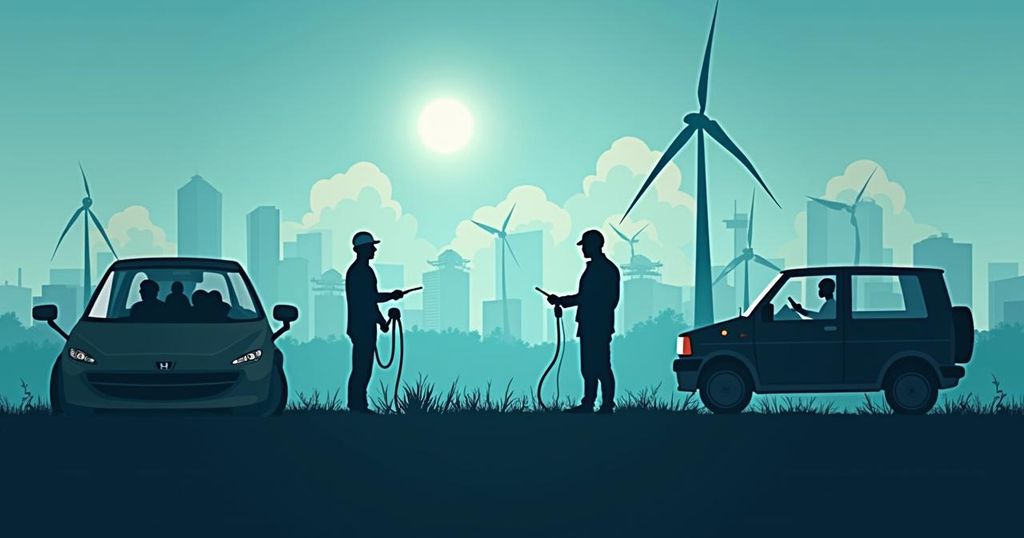Electoral Clash: Walz and Vance Debate the Future of Clean Energy and Manufacturing Jobs
During the vice presidential debate, JD Vance and Tim Walz confronted each other over clean energy policies and manufacturing jobs in the U.S., responding to climate change issues. Vance criticized the current administration’s record and called for increased American manufacturing, while Walz defended the Biden-Harris administration’s achievements through the Inflation Reduction Act, which he claims has created numerous jobs in clean energy sectors. This debate underscores the ongoing political conflict surrounding energy policies in the upcoming elections.
During the recent vice presidential debate held in Washington, JD Vance and Tim Walz engaged in a contentious discussion regarding clean energy and the creation of manufacturing jobs, notably in the context of competing with China in the industrial sector. This exchange was prompted by inquiries from CBS News moderators concerning measures to combat climate change, particularly in light of the devastation wrought by Hurricane Helene. JD Vance, the Republican nominee and current U.S. Senator from Ohio, stated, “If we actually care about getting cleaner air and cleaner water, the best thing to do is to double down and invest in American workers and the American people. And unfortunately, Kamala Harris has done exactly the opposite.” In contrast, Tim Walz, the Democratic nominee and Governor of Minnesota, defended the Biden-Harris administration’s record, asserting that substantial investments through the Inflation Reduction Act have led to the creation of numerous jobs across the nation, noting, “We got close to an agreement because all those things are happening.” He elaborated that under this administration, a significant investment was made, leading to approximately 240,000 job creations as a result of the IRA, despite independent estimates placing the number around 105,000 as of May 2024. Vance criticized the Democratic approach, arguing that it has not sufficiently addressed the challenges posed by China, which remains a leader in solar panel production. He indicated, “…you want to produce as much energy as possible in the United States of America, because we’re the cleanest economy in the entire world.” Vance’s comments reflect a broader Republican narrative that seeks to regain manufacturing jobs through policies aimed at eliminating environmental mandates and increasing tariffs on imports, particularly from China. Tim Walz highlighted the expansion of electric vehicle jobs under the current administration, with significant developments such as a battery plant in Jeffersonville, Ohio, which is anticipated to create over 2,000 jobs. However, this facility had already been in the planning stages prior to the IRA’s enactment, according to Inside Climate News. The debate underscored the stark differences between the candidates regarding energy policies, with Vance pledging to restore American manufacturing while highlighting the failures of the current administration. Both candidates acknowledged the implications of these policies on the global stage, especially concerning climate change and U.S. economic competitiveness.
The debate on clean energy and manufacturing jobs is central to the current political discourse in the United States, particularly in the lead-up to the elections. The Inflation Reduction Act is a significant legislative achievement aimed at addressing climate change through substantial financial investments in renewable energy, which both parties are keen to claim as part of their respective agendas. As the U.S. faces challenges from countries like China, particularly in the renewable energy sector, the candidates’ strategies reflect broader themes of economic recovery, job creation, and environmental sustainability. This debate not only illustrates their differing perspectives on energy policy but also highlights the critical importance of sustaining American manufacturing in the face of global competition.
In summary, the recent vice presidential debate between JD Vance and Tim Walz showcased a fundamental divide in energy and manufacturing policy perspectives. Vance advocated for a robust return to American manufacturing and energy production, criticizing the current administration’s achievements. Walz, on the other hand, emphasized the considerable investments made in clean energy through the Inflation Reduction Act, asserting that it has resulted in significant job creation. This discussion is emblematic of the broader electoral battle over how best to approach climate change and economic revitalization in the United States.
Original Source: www.detroitnews.com




Post Comment